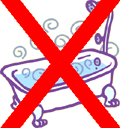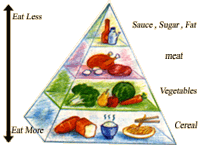|
|
Prevention of contact dermatitis depends on the following:
 |
Investigation of the medical history to identify irritants for future avoidance. |
 |
If the irritant is occupation-related, working procedures should be modified or the environment improved to avoid the irritant. Precautionary measures should be re-enforced such as the wearing of protective clothing and gloves to cover the skin if working with an irritating substance. |
 |
Hot baths should be avoided when a rash is present as this may make the condition worse. Lesions should not be scratched. If Western drugs are needed, they should be applied only under medical advice. |
| |

Hot baths worsen the condition |
|
Dietary measures
From the TCM viewpoint, both food and drugs come from the same source and food can vary in character. This means that food can promote health or have an adverse effect on it. Seafood, spicy and hot food trigger the body to produce more wind, heat or dampness evils, which are causative factors in contact dermatitis. In TCM, dietetic restraint is urged, meaning that some foods should be avoided in certain disorders or while certain medicines are being taken. For example, intake of salty food should be limited in persons who are edematous have fluid retention and a greasy diet avoided in cases of diarrhea. For contact dermatitis, a balanced diet should be eaten. Individuals susceptible to this disorder should avoid alcohol, and eat less seafood or spicy and hot food. Drinking plenty of water is also advisable to clean the toxins from the body and prevent illness.

Food pyramid |
| |
| |
|
| |
|